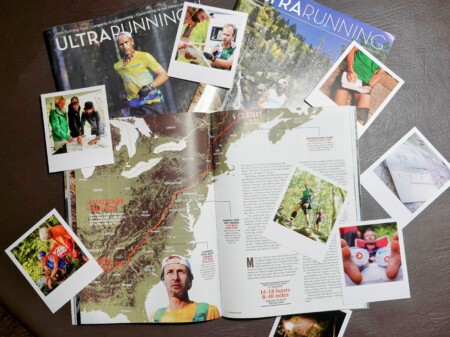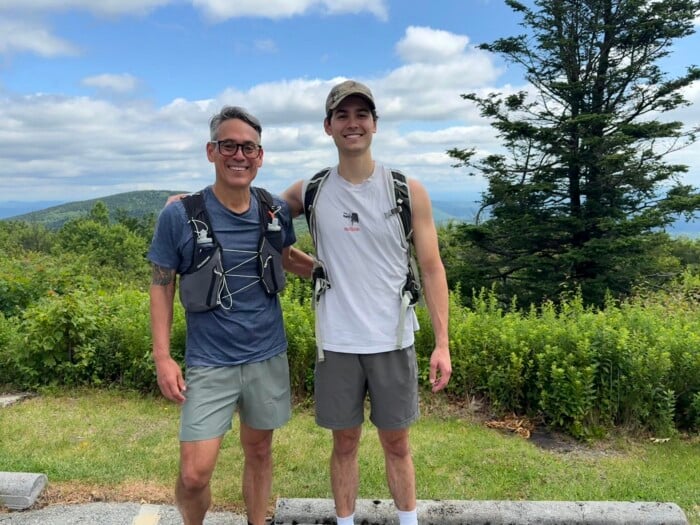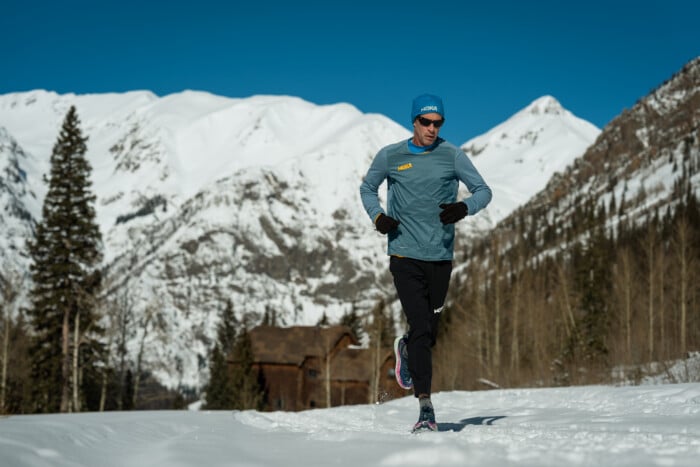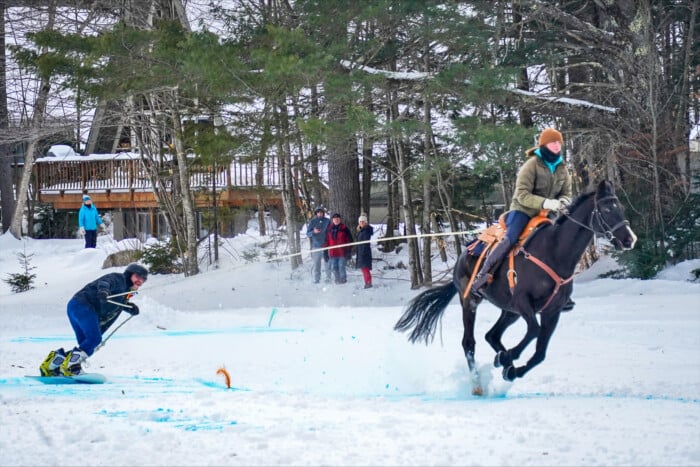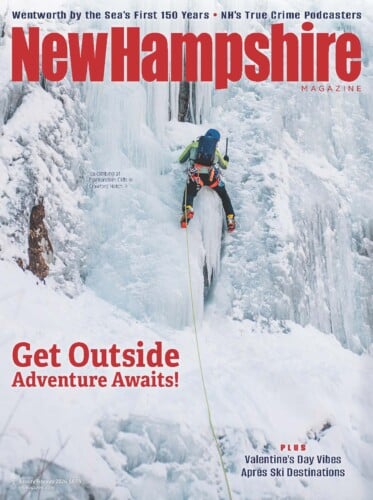Becoming Speedgoat
How a New Hampshire kid became an ultrarunning legend
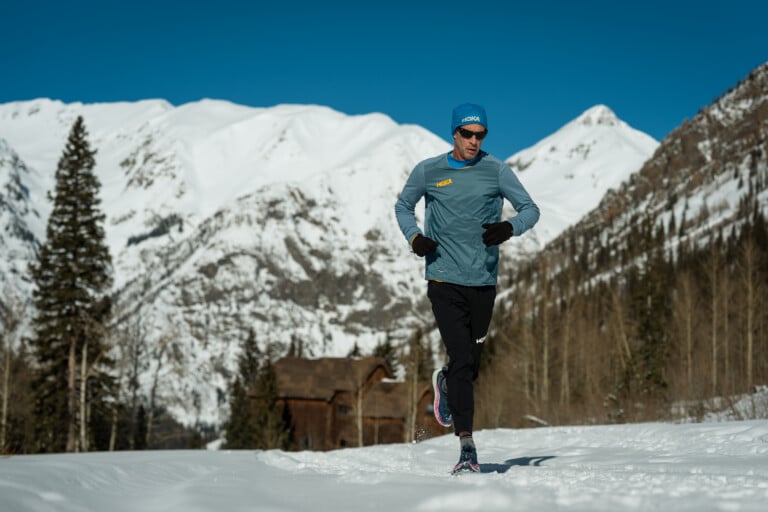
To most people, the idea of running 100 miles seems impossible. To Karl Meltzer, it’s the foundation of his career and the basis for his personal mantra: “100 miles is not that far.”
This philosophy began in the Granite State, where the winningest 100-mile runner grew up before becoming a legend of ultrarunning, a sport defined by footraces longer than 26.2 miles.
From his start as a high school cross-country champion in Manchester to his nickname “Speedgoat,” Meltzer’s story is one of relentless passion and a unique ability to excel at what he calls “rocky junk.”
Meltzer was born in Philadelphia, but his family moved to Auburn, New Hampshire, when he was 3. He loved the outdoors, a passion inherited from his father, Karl Sr. They were skiing down black diamonds together by the time Meltzer was 6 and doing multi-day bike trips by age 12. In the neighborhood where his parents still live, Meltzer would spend hours outside.
“He never watched much TV,” said Karl Sr. “He was always outside playing basketball, riding his bike.”
Karl Sr. described how he and another dad from the neighborhood would race 10Ks and marathons. As their kids got older, they would tag along on training runs. By middle school, Meltzer was tagging along and keeping up with his older friends during cross-country practices at Manchester High School Central.
At Manchester Memorial High School, he excelled at sports. In 1985, he won the New Hampshire Class L (now Division 1) cross-country state championship and also placed second in the New Hampshire junior golf championships. Meltzer recalls playing 45 holes of golf a day in the summer, mostly at Derryfield Country Club or the Candia Woods Golf Links.
“I rode my bike 8 miles there and back, all summer long,” he said. “I was just outdoors all day every day.”
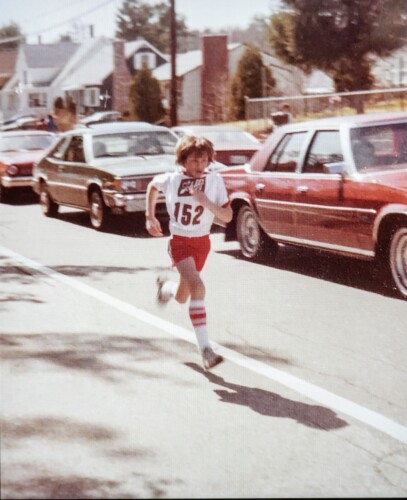
Meltzer’s endurance roots run deep. Growing up in Auburn, NH, he tagged along on runs with his father and older friends from the Central cross-country team, developing into a state champion at
Manchester Memorial. Photo courtesy/ Karl Meltzer
Reflecting on that period, Karl Sr. said his son kept meticulous log books and records, habits he said demonstrated the persistence, commitment and diligence that would be critical to his later success.
After high school, Meltzer spent a year at Plymouth State University but didn’t enjoy it.
“I hated to study… I didn’t know what I was doing there and bailed,” said Meltzer.
Throughout that winter, he would ski every weekend with a friend, bumming passes to get on the slopes. That friendship led to a pivotal decision to spend the next winter skiing at Big Sky, Utah.
“We skied 120 days that winter but when summer came, I stayed in Utah,” said Meltzer. “Those mountains were too cool.”
Meltzer began bartending for a living at a ski resort bar called the Keyhole, and spent his free time biking, running and skiing. It wasn’t long before running became his favorite thing to do.
Meltzer recalled a story from early in his western tenure when some friends invited him to go for a three-mile run up to a mountain lake that included 2,000 vertical feet of climbing.
“The snow had just melted off. I was in awe,” said Meltzer. “My bike was put in the garage and we went running all the time.”
He began competing in races again. Meltzer said he would squirrel away quarters in a Jose Cuervo bottle behind the bar all winter and have enough for two or three races each season.
One momentous race from that period was the Pikes Peak Marathon in Colorado. His iconic nickname, “Speedgoat,” was born on the drive home from the 1998 event, where he placed fourth. After a jackrabbit darted across the road, Meltzer blurted out to his friends, “What a speedgoat!”
The name stuck.
Friends at the Key Hole told Meltzer about another race, the Wasatch Front 100 Mile Endurance Run.
“I was winning shorter races but who the hell knew what I’d do for 100 miles,” said Meltzer.
The first time he attempted the challenging Wasatch Front 100, Meltzer had no idea what to eat, carrying just six rock-hard power bars for the first 40 miles. He was leading until mile 39, but things unraveled, and the final 25 miles took
him 12 hours; he crossed the finish line in 281/2 hours.
“I finished the damn thing. I had no quit in my head.”
The Wasatch became Meltzer’s focus but it would take several attempts before he found real success. That came during the 1998 race. With a good training build-up that included the fourth-place finish at Pikes Peak, he won Wasatch and set what was then a course record of 20 hours.
“I always like to excel at the difficult things. I want rocky junk. The Wasatch are steep, rocky, loose and difficult. I got very, very good at technical trails.”
That win at Wasatch, the first of six, was the start of his record-making career. He has since won 50 100-mile races, including multiple victories at prestigious races like Massanutten 100 (four wins) and Hardrock 100 (five wins).
“I was saying to myself, ‘how do I make a career out of this?’ No one made money at it back then; you were lucky if you got shoes out of it.”
He joined the Montrail Elite team, receiving gear and earning $500 a year, but a chance encounter with Red Bull ambassadors and a course record at the Hardrock 100 later that year launched his career. The resulting sponsorship and a feature in Sports Illustrated cemented his ability to make a living from the sport he loved.
Over the following decade, Meltzer set records, landed sponsorships, started his own race (the Speedgoat 50K) and continued to elevate the profile of the sport. In 2006, he was named Ultrarunner of the Year.
Around 2010, Meltzer was approached by Nico Mermoud, the co-founder of a nascent shoe company called Hoka One One, to try one of a handful of early prototypes. Meltzer was sold after a lap around the block and became their first sponsored athlete. The relationship rocketed like the company’s success and Meltzer now has his own line of popular trail running shoes, the Hoka Speedgoat, which launched in 2015.
Meltzer also set out to establish a new speed record on the Appalachian Trail. He came up short in 2008 and 2014, sidelined by injuries and logistical challenges, but gave it one more go in 2016. After a year of preparation that included securing a Red Bull sponsorship and scouting every road crossing along the 2,189-mile-trail, Meltzer set out from the southern terminus at Springer Mountain, Georgia. Forty-five days, 22 hours and 38 minutes later, he finished atop Mt. Katahdin, Maine. Red Bull commemorated the since-bested record with the short film “Karl Meltzer: Made to Be Broken.”
Meltzer called the AT a pivotal point in his life, a time when he realized a day is not that long and life is short. It led to his mantra “100 miles is not that far.”
Today, Meltzer, 57, lives in Ridgeway, Colorado, a town in the rugged San Juan mountains. He runs a small coaching business and also enjoys running 50 to 60 miles of “rocky junk” each week, training for the handful of 100-mile races he competes in each year.
In a sport where events are regularly measured in days, many athletes ascend to the top of the field for a few key victories before burning out and disappearing from the scene. Meltzer attributes his 40-plus years of competitive running to keeping his mileage at a reasonable level (reasonable is relative in a sport where most professional athletes put down double his mileage each week), focusing instead on efficiency, nutrition and minimizing downtime in races.
“You don’t have to be super-fast to do well at a 100. Efficiency is key,” said Meltzer, who fills some of his time as a
professional ultrarunning coach.
While he still podiums frequently in his races, Meltzer said he mostly runs for his headspace and enjoys the freedom, the fresh air, and the beauty it brings him.
“I get out there because I need to accomplish something every day. Even if I walk five miles, I’ve gotten something done,” he said.
Reflecting on his career, Meltzer said he never would have imagined that following his dad around on skis or on runs would ever turn into a career. Instead of knowing what he wanted to do, he simply followed his passion.
“A lot of things have fallen in my lap and running was one of them,” Meltzer said. “I was lucky to find what worked for me and fortunate to find a way to make it work.”
